PERSONAL MEMOIRS FROM 1933 ONWARDS
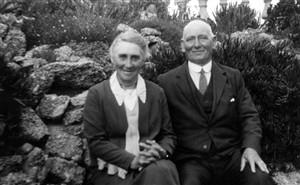
Oakley grandparents
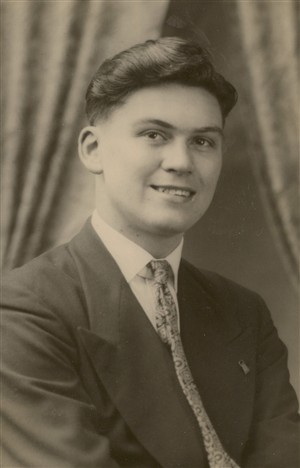
Photo of me about 1950
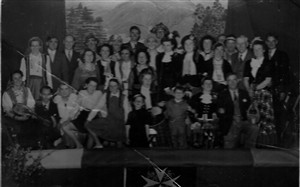
Carnivival Soc.Concert '50
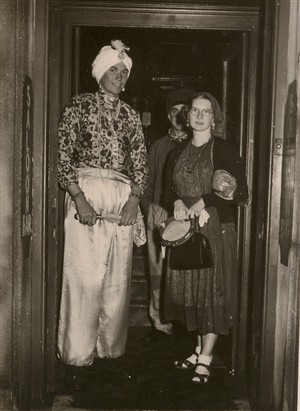
Lewes Bonfire Night '50
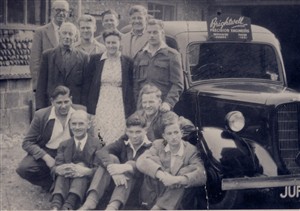
Brightwells Fort Road
Life in Newhaven as a young boy
By John Oakley
These are just my personal memories of growing up in what was very different world from that we all live in today. I am only 83 this April and I hope others of a similar age. or older, may be able to add additional information. Everybody's memories will be different but together will form a more complete picture. I may repeat some of my previous writing to help continuity, likewise photos. This is mainly about me but I feel sure other residents may add their own recollections. Much of the the text I have pasted from a document with over 300 family photos as family history for my children, all saved on cloud.
I was born on 7th April 1933 to Robert Shead Oakley and Maud Ada Oakley (nee Bennett) at 58 Lawes Avenue Newhaven. Next door at 56 lived my grandparents Robert William and Anne Oakley (nee Shead). My uncle and aunt live at 62. Jack and Annie Simmonds (nee Oakley).
I've added an early photograph of me which some of you may recognise.
Housing
Our house was a 3 bedroomed terraced house, had a back yard with flower beds opening onto a back lane used for trade deliveries, dustmen, coal and etc., a lean to greenhouse was attached to the back of the house. The back yard had a gate onto a lane used for dustbin collections etc. As you enter the house from the front, the room on the left was the front room, this was the only room furnished with carpet, the rest were linoleum. It had a 3 piece suite, sideboard, glass cabinet on top of a large built in cupboard and small table in the window with a fern on top. The next room on the left was our main living room. In here we had a round mahogany table with chairs and a chaise longe. On top of the built in cupboard, we had beautifully made cabinet, filling the whole alcove, made by my father in mahogany. Carrying on to the kitchen at the back, a butler sink with pump for rain water, Copper in a brick built enclosure with a fire grate underneath to heat the water, gas cooker and a black kitchener. We had 3 bedrooms, 2 double and a single. 2 of the bedroom suites were made by my father. One in mahogany, the other in teak.
We did not have electricity. Cooking, water heating and lighting were by gas. Very few people had central heating any that did exist was in very large houses or public places. The radiators were big clumsy cast iron, fed by thick galvanised iron pipes. We did not have a bathroom but had a full size plumbed in bath under a hinged kitchen table. Which initially we filled from the copper, using buckets, later by an Ascot. We had a proper toilet with a pull chain cistern, this was part of the main house but the only door was from the outside the back door with a glass roofed shelter. Refrigerators and washing machines were rare and owned by very few people (My ‘wealthy uncle’ had a washing machine, but it was operated by turning a handle), we used the copper copper which we stoked with coal to boil the wash, in soft rain water pumped up to the butler sink, by a hand pump from the tank under the house (this was in addition to mains water). Our kitchener (cooking range) we stoked with coal, used only occasionally for joints and cakes, in particular at Christmas. Most of our cooking was by gas cooker. The coal was delivered by the coalman, using a horse drawn truck, he then carried in a one hundredweight (112 pounds ) open top sack, through the house and tipped it into a bin near the copper.
The only heating was by a single coal fire in the middle room, cleaned out and lit every morning. We also had a portable paraffin heater (ugly and smelly) the front room also had a fire place, which was used on special occasions.
Gas lighting did not extend to the bedrooms, we carried small night lights and candles. The wash stands were used to wash in the bedrooms but water had to be carried from the kitchen
It was common practice to use one room only and the kitchen for all daily activities. The front room was kept as best and only used when we had visitors for the day. It was usual for most families to have a best room (the front room) that was rarely used.
Horses were in use for many activities eg. Drain clearance, Milkman, Baker, Coalman and Rag and Bone man etc. One baker (Grooms) had a van. This van made an unusual noise because it was driven by a two stroke engine under the driver’s seat and a duplex chain to one rear wheel (Trojan).
Social and Medical
Very few people owned cars or had telephones, those who did were usually business owners or doctors. Radios were still large valve sets requiring batteries and accumulators, because few had electricity, the accumulators had to be taken to the shop for charging. Many like ourselves rented relay radio, sent by wire from a central receiver to our loudspeaker. (Radio Rentals)
Doctors usually owned the largest houses in the town in, some cases, part was used for their surgery. My doctor was the exception; with his partner he had a purpose built surgery with his own dispensary. There was no national health into some form of BUPA. We paid into a scheme which I think was called National Deposit (not sure). We also belonged to The Hearts of Oak.
Lack of refrigeration meant that most housewives shopped daily to get fresh meat and any other perishables. Little of our fruit and vegetable was imported so we ate according to the season. Even eggs were cheaper in some parts of the year. We would buy several dozen when cheaper and preserve them in ‘Waterglass’ to use later when more expensive. For this purpose we had a special bucket with lid and a lift out cage.
Few (if any) people drank wine with meals,(having wine with meals, this started about 1950) beer was served at the local public house and from the off-licence. Most households kept a bottle of sherry for special occasions or special visitors and a bottle of brandy for medicinal purposes some bought bottles of beer or stout. Licensing hours for pubs were very restricted.
My mother was from a Wesleyan Methodist family and pubs were considered not to be the place for nice people to meet and drink. I think a lot of people took beer home from the ‘Off license’ or the ‘Bottle and Jug.’
You might assume from this we were very poor. NOT the case, this was just the standard of living enjoyed by most. We owned our on property, the poorer rented some in less desirable parts of the town. Even at this level there was a social divide. As a trained tradesman and house owner, my father would have been far from the bottom.
Newhaven was quite a busy port with cross channel ferries to Dieppe, coal, grain and timber imports to mention but a few. The Southern Railway was the largest employer, the only other sizeable factory was Parker Pen, but they employed only a few hundred against Southern Railway’s thousands.(not sure how many). The work included maintenance on the locomotives , rolling stock, stations, ships, as a result employed just about any trade you can name, plus managers, clerical staff and labourers.
Travel for most people was by train and bus. Many of those living in Newhaven worked for the Southern Railway and as staff members were able to buy reduced rate tickets and were allowed free journeys several times in each year. Looking at some of the old postcards it appears that some travelled all over the country. I find it hard to believe that ladies would have enjoyed a visit to the industrial towns of the north. Some have even sent home postcards of factories. My mother continued to get privilege tickets even after my father died.
My father died when I was only 2 years old. I can just remember him returning from work, each day, and giving me piggybacks.
Although I did not understand, I remember the ambulance coming, men in white suits and caps came into our house carrying a folded stretcher and went upstairs. At this point I was taken next door to my grandmother and watched from her window the stretcher being taken into the ambulance. He died of severe inflammation of the kidneys, with modern medicine he would have been cured. The problem was undoubtedly caused by working up to his waist in sea water in December. He died in early January at The Royal Sussex County Hospital, Brighton. I have no recollection of his funeral, I was probably left with an aunt. Unfortunately, the death of my father caused a rift in the family. From that time on until death, my Grandfather did not speak to my mother. My father was his only son and he blamed the death on her, as he thought she failed to look after him properly during his short illness.
After my father died my mother’s income was only a widow’s pension of 10 shillings per week (50p) plus a small income from £750 invested and left in trust by my father. (After my mother’s death, the capital was divided between my children at the age of 21) My mother also had various part time jobs. If I was not at school was left in the care of my elderly maiden aunts. They used to tell me ‘little boys should be seen and not heard’. This was only when she was working. In 1939 September I was taken to Brighton hospital to have my tonsils removed and was recovering at home when I heard Neville Chamberlain, on the radio, announce that a war had been declared on Germany. I was sitting on the floor at 2a Newfield Road, with my mother and 2 spinster aunts. Mabel and Bertha. From their DOB they had all been born in the Victorian era, so still had Victorian ideas as to how children should be treated.
THE WAR YEARS (I was now 5years old)
The first I can really remember is being taken to the fire station in Fort Road, Newhaven and being fitted with a gas mask. Because I was quite big for my age I had to have a proper grown up version, boys smaller than me were given red ‘mickey mouse ones and babies were given a sort of fabric box with a visor, a filter and a pump. Everyone carried them with them, when out, if seen without them, we were stopped by a policeman or an air raid warden (ARP). In London and areas likely to be bombed, children were evacuated to the country areas away from the factories and areas where armaments were produced. In Newhaven, houses overlooking the harbour and the Brighton Road were commandeered and use as billets for soldiers.
Prior to the disastrous Dieppe Raid August 1942, many of the soldiers billeted or camped in Newhaven were French Canadians. The town came to know many of them because they used the local businesses and were welcomed into the local clubs (my mother served behind the bar at the Conservative Club). I can remember standing on the cliff tops at Newhaven, the evening before the Dieppe Raid, and watching thousands of soldiers boarding the invasion craft on the quay. Late at night, we heard the heavy tanks going through the town to the dock area heading towards France. Unfortunately this raid was a complete disaster, few returned, and towards the end of day there was a continuous convoy of ambulances through the street to the hospitals, mainly Brighton. Very many must have been killed as the absence of Canadians in the town was noticeable.
We only had a few bombs dropped in Newhaven during the war years, one of those dropped in the Lewes Road wiped out complete row of houses and killed some of the occupants, a few nuns were killed when the convent was bombed, also a few fire bombs, We only had a few broken windows and ceilings down. Doodle Bugs used to pass over but fortunately never cut their engines and fell.
For our own protection most houses had, or shared, an Anderson or Morrison shelter. To warn us of bombers on the way, sirens were sounded. For a gas attack the warning was rattles and police whistles, fortunately this was never necessary. Throughout the war our house only suffered minimal damage. However just after D day a large barge full of high explosives came loose in the storm and beached itself under the cliff near the Newhaven fort. It exploded and completely devastated many of the houses towards the south. We were lucky it only blew our back windows out complete with frames, smashed all the glass in the front windows and caused most of our ceilings to fall in. Nobody was hurt, as far as I know. The explosion was heard as far away as Lewes and Seaford. You may wonder how we all got on with house insurance. Everyone paid into a bomb damage fund. This entitled us to damage repairs, as far as I know free. During the war years some of the Royal Navy officers were billeted with us. After the war we continued to take lodgers, like the new curate and customs officers on temporary assignments to the port. Most of them came by recommendation from members’ of my father’s masonic lodge.
Rationing. In order to keep the shipping for essential supplies imports were limited. Bananas and other tropical fruits disappeared for the duration of the war. Cars were taken off the road, petrol coupons were only available to essential services. Ration books were issued that limited the amount of sugar, butter, sweets, meat and clothing. If you needed a new coat you had to save the coupons or do some swaps.
My Early Years
For a child growing up life was very different. We had far more freedom than we feel able to give our children today. At 7plus years old I was allowed to ride my bicycle to school. When not at school I was free to wander with my friends. This included visiting the ack-ack gun sites and meeting both British, other soldiers from all parts of the empire and USA. Despite having all these strangers from abroad I have no recollection of any murders or interference.
We often watched the swing bridge being opened and the gas main disconnected. When this happened the gas pressure would drop to all West of the bridge. The only source of gas was gasworks in Railway Road. Until the bridge closed we were supplied from gasometers, some of which we situated just off to the left of Lewes road near the duck pond. The casual labour to open the bridge was provided by dockers, waiting for work. I seem to remember they had a small hut to the right of the bridge next to the Southdown bus stop. Labour requirements were posted on a board just outside the gates leading to the workshops and the cross channel ships, prior to a cargo ship arriving (Stevedores, labourers etc.) To open the bridge they had to disconnect both ends of a very large gas pipe supplying the West of the town, lower the moving section and then insert a large capstan in the centre into which long poles were inserted. (not sure if it was 4 or 6) I think it was 2 men to each pole. [4 poles, with 2 men to each pole - Editor] They then turned the capstan to open the centre section of the bridge and the same procedure in reverse to close it.
My Years at School
I started when I was 4 years old, 1937. In the infants class of the council junior school. In the mornings we were taught, and after lunch portable beds were laid out in the classroom and we slept for about an hour followed by a story, then collection by our parents. Outside the school, Walls ice-cream man used to wait with his ‘STOP ME AND BUY ONE‘ tricycle. If we were lucky we were bought one. This all stopped at the outbreak of war, 1939, due to sugar rationing.
At 7 years old, I started the senior school. I was now allowed to ride my small bicycle to school. Had I have stayed there I would have taken the Eleven Plus and if successful would have gone to Lewes Grammar School. Boys not passing would have left at 14 with no exams.
Just before I was 8 years old, I sat an entrance exam for the Royal Masonic School, Bushey Herts. The council education I received must have been fairly good, because I took the exam with some boys who were attending private schools and attained sufficient marks to be placed in the school ‘A’ stream. I started at Bushey Junior School, on 29th April 1941. I arrived at Victoria Station and remember seeing some of the bombed buildings.
Although I was at boarding school, I had fairly long holidays, which meant I was living in Newhaven for about 15 weeks of the year. During the holidays I was free to roam.
I was put in F house Form 1A and had a label attached to my lapel, in case I was lost in this big school. Quite a change for little boys, some used to get ‘homesick’ and cry to go home, but eventually got used to being at school. No weekends home or visits were allowed accept on special occasions (eg Speech Day). The school had a policy of ensuring that every boy had the same clothes and equipment which were supplied by the school. The boys were from very different backgrounds. I can remember sons of Ambassadors, eminent surgeons. Vice Admirals, colonels and many from manual trades, plumbers, carpenters and etc. We were not allowed to wear any of our own clothes and all were allowed the same pocket money.
The school was generous with clothes each year. Tailors from Gorringes, Victoria Street, visited the school and we were all measured for a new suit in the winter, blazer and grey trousers in the summer. We had school and house ties, bootlaces during the week and silk ties for Sundays and special events. On site we had our own shoe shop and repairer.
Being at school during the war years, I consider may have been an advantage. The younger masters were called up and as a result the older more experienced ones stayed to teach us.
We were 50 boys to a house, the junior and senior school each had 8 houses. There were two dormitories to each house, but during the war years all 50 of us were packed into the dorm on the lower floor. (Air raid precaution) If the warning siren sounded, we had to pick up our pillows and blankets and go down to the refuge room until all clear. This was a reinforced room down stairs with bunks.
Throughout the day, due to classes and other activities we had few hours of our own time. As near as I can remember the pattern in the junior school was as follows:-
Up at 7.15, wash and dress, inspection to make sure we were washing properly and cleaning our teeth. Shoes were inspected to ensure they were properly polished.
8,15 am, Breakfast then school assembly and prayers followed by classes with a short break mid-morning. Then lunch, house assembly and plans for the afternoon. Then, afternoon classes except Saturday. Every day except Sunday we played cricket, hockey or football and swimming, depending on the season. Sport was compulsory. Each house had two pitches. After sport we had a short period to ourselves before dinner, prep and bed. On Saturdays and Sundays we had no set prep. During any spare time we were encouraged to read, to have hobbies eg. Model aeroplane making crystal sets etc. Each house was issued with large earthenware jars of ‘Cod Liver Oil and Malt ’we were all given a full desert spoon each day. During the war this was supplied by the Ministry of Food.
On Sundays we all attended morning and evening services. Before lunch we all sat down in the day room and wrote at least one letter home. In the afternoon, after reading for an hour, approved books, we were taken for a long walk in crocodiles by our house masters. Then time to ourselves before and after dinner. Most of us had some sort of hobby eg. Model aeroplane making and flying, crystal sets, roller skating or shinty in the large playground, table tennis etc.
The end of term.
The house matron issued use with our clothes needed for the holidays. We packed our own cases about a week before. Wrote the labels, two for the outside and one for the inside. They were then collected and sent home by rail using ‘Luggage in Advance’. We all wrote a list to take home entitled ‘useful things for next term’ eg. Tooth paste, soap, stamps etc.
For the journey home we would all assemble and head for Bushey & Oxley Station, both the Junior and the Senior schools, 800 in total.
At the station we had our own steam train waiting for us, (very similar to the Hogwarts Express). This would take us to Euston and from there we caught the tube to other London terminals to finish the journey home.
The photos I just added: The first was a Newhaven Carnival concert in the early fifties, I'm at the back with the straw hat. At the front are several mandolin players, I think most of them were from one family. I hope someone may be able to pick their relations or friends out.
The second of me with a turban, taken in Lewes on Bonfire Night. The outfit was lent to me by my Uncle Walter Bennett, who lived in Newfield Road and was a Carnival Society committee member.
The Third was taken at the Brightwell Bros. factory in Fort Road. (My first job as an apprentice toolmaker)
The last is my school at Bushey, Herts
I hope others of my age or older may be able to add their own experience.